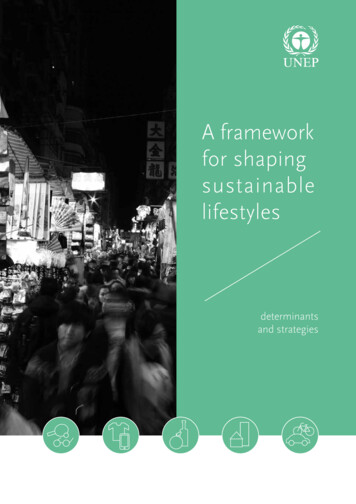
Transcription
Curriculum FrameworkEducation forSustainableDevelopment
Curriculum FrameworkEducation for Sustainable Development2nd updated and extended edition, 2016edited byJörg-Robert Schreiber and Hannes SiegeA contribution to the Global Action ProgrammeEducation for Sustainable DevelopmentResult of the joint project of theStanding Conference of the German Ministers of Education and Culture (KMK) and theGerman Federal Ministry of Economic Cooperation and Development (BMZ)
ImprintOn behalf of:KMK (Standing Conference of the Ministers of Education and Cultural Affairs)www.kmk.org, E-Mail: poststelle@kmk.orgTaubenstraße 10, D-10117 BerlinPostfach 11 03 42, D-10833 Berlinphone number: 49 (0) 30 254 18-499Fax 49 (0) 30 254 18-450BMZ (German Federal Ministry of Economic Cooperation and Development)www.bmz.de, E-Mail: poststelle@bmz.bund.deWork location BonnPostfach 12 03 22, D-53045 Bonnphone number: 49 (0) 228 99 535-0Fax 49 (0) 228 99 535-2500Work location BerlinStresemannstraße 94, D-10963 Berlinphone number: 49 (0) 30 18 535-0Fax 49 (0) 30 18 535-2501Executed by:ENGAGEMENT GLOBAL gGmbHService für EntwicklungsinitiativenTulpenfeld 7, D-53113 Bonnphone number: 49 (0) 228 20717-0Fax 49 (0) 228 20717-150www.engagement-global.deE-Mail: info@engagement-global.de
Translation of the German edition 2016 Engagement Global gGmbH, Bonnby Thomas StukenbergPublisher’s Editor: Jörg Peter MüllerLayout: zweiband.media, BerlinTechnical realisation: zweiband.media, BerlinCover design: Corinna Babylon, BerlinLogos on the front page: United Nations: Sustainable Development GoalsEditors: Jörg-Robert Schreiber und Hannes SiegeTechnical editing: Jörg-Robert SchreiberOn behalf of:Standing Conference of the Ministers of Education and Cultural Affairs (KMK),German Federal Ministry of Economic Cooperation and Development (BMZ),Engagement Global gGmbHIn case copyright holders of texts and pictures have not been identified correctly justifiedclaims will be compensated within the customary regulations.All internet links have been checked in November 2016. The content of these websites havebeen carefully examined. No liability is assumed for their content and the sites linked tothem.This work is protected by copyright. It can be downloaded and used for educational purposes. Any commercial use requires the approval of Engagement Global gGmbH.2nd updated and extended edition, 2nd printing 2016The content of each printing of this edition is unchanged. All printings can be used side byside. 2016 Engagement Global gGmbH, BonnThis work and its parts are protected by copyright. Upon approval by Engagement GlobalgGmbH, Bonn, the work may be uploaded to a network and made accessible to the public.Printing: Firmengruppe APPL, aprinta Druck, WemdingISBN 978-3-06-230062-2
4Table of contentsTable of ContentImprint .2Table of contents .4Foreword of the President of the Kultusministerkonferenz (KMK) .9Foreword of the Minister for Economic Cooperation and Development (BMZ) .10The joint project of the KMK and BMZ to develop a Curriculum Framework 2004–2015,Project group – Working committees .11List of acronyms and abbreviations .14Abstract .16Implementation Concept 3.51.3.61.3.71.4Conceptual foundations of the Curriculum FrameworkTasks and target of the Curriculum Framework . 23BOX 1: Global change – a challenge for our capacity to learn .24BOX 2: Buen Vivir and sustainable development .27Development of the concept . 28Reference points of Global Development Education in the context ofEducation for Sustainable Development .28Update and extension to the Framework .28International and national resolutions .29BOX 3: National boards and resolutions on ESD .35Global development as object of the Framework . 36The target dimensions of the fundamental principle of sustainable development .36Understanding the target dimensions as dimensions of development .37The structural levels (levels of action) of the development dimensions .38The linkage of heterogeneous structures in the course of dynamic globalisation .39BOX 4: Eurocentrism .41Coherence of the dimensions of development as a central challenge .42BOX 5: Global governance and the paradox of sovereignty .48Balance between global and local .49Development policy and global development .50BOX 6: Sustainable Development Goals (SDGs) .51Bibliography . 5422.12.22.32.42.52.6School conditions and educational challengesLebenswelt (lifeworld) change . 57BOX 7: Inclusion .58Awareness of global problems and value attitudes . 65Use of digital media and media-related lifeworlds . 68New tasks for schools . 75Educational challenges . 78Bibliography and Links . 82
ncies, themes, standards, design of lessons and curriculaIntroduction . 86Fundamentals of a model of competenciesfor Global Development Education/ESD . 88Competency areas . 91Selection and definition of competencies . 94Core competencies of Global Development Education/ESD . 95Thematic areas and choosing topics . 96Performance standards . 100Designing learning units . 101Guidelines for creating curricula . 104Bibliography . 108Implementation in school subjects and learning areasIntroduction and overview . 111Primary school . 115Contribution of primary school subjects toGlobal Development Education/ESD .115Primary school competencies at the end of year 4 with reference to thecore competences of Global Development Education/ESD .117Sample topics .120Competency-oriented learning unit: Seeing new ways ( ) .121Performance monitoring and learning-progress interviews .125Practice material .126Bibliography .1284.2Secondary Level I: Field of language, literature and arts . 1294.2.1 German .1304.2.1.1 Contribution of the subject German to Global Development Education/ESD .1304.2.1.2 Subject-related competencies (Secondary School Certificate/10 school years)linked to the core competencies of Global Development Education/ESD .1334.2.1.3 Sample topics .1374.2.1.4 Competency-oriented learning unit: German in the world .1424.2.1.5 Performance Monitoring and learning-progress interviews .1534.2.1.6 Bibliography .1554.2.2 New foreign languages .1574.2.2.1 Contribution of new foreign languages to Global Development Education/ESD .1574.2.2.2 Subject-related competencies (Secondary School Certificate/10 school years)linked to the core competencies of Global Development Education/ESD .1604.2.2.3 Sample topics .1634.2.2.4 Competency-oriented learning unit: Adivasi Tea-project .1654.2.2.5 Performance monitoring and learning-progress interviews .1744.2.2.6 Bibliography and sources .175*taken unchangend from the 1st edition
64.2.3 Arts .1764.2.3.1 Contribution of the subject Arts to Global Development Education/ESD .1764.2.3.2 Subject-related competencies (Secondary School Certificate/10 school years)linked to core competencies of Global Development Education/ESD .1784.2.3.3 Sample topics .1814.2.3.4 Competency-oriented learning-unit: WORLD IMAGES (form 9/10) .1834.2.3.5 Performance monitoring and learning-progress interviews .1904.2.3.6 Bibliography .1914.2.4 Music .1924.2.4.1 Contribution of the subject Music to Global Development Education/ESD .1924.2.4.2 Subject-related competencies (Secondary School Certificate/10 school years)linked to the core competencies of Global Development Education/ESD .1944.2.4.3 Sample topics .1974.2.4.4 Competency-oriented learning unit: MUSIC IS CHANGE (form 9/10) .1994.2.4.5 Performance monitoring and learning-progress interviews .2114.2.4.6 Bibliography .2124.3Secondary Level I: Field of Social Science . 2144.3.1 Political Education .2154.3.1.1 Contribution of Political Education to Global Development Education/ESD .2154.3.1.2 Subject-related competencies (Secondary School Certificate/10 school years)linked to the core competencies of Global Development Education/ESD .2164.3.1.3 Sample topics .2194.3.1.4 Sample assignment: Global Governance .2204.3.1.5 Bibliography .2244.3.2 Geography .2254.3.2.1 Contribution of the subject Geography to Global Development Education/ESD .2254.3.2.2 Subject-related competencies (Secondary School Certificate/10 school years)linked to the core competencies of Global Development Education/ESD .2274.3.2.3 Sample topics .2304.3.2.4 Sample assignment: Galápagos Islands .2324.3.2.5 Bibliography .2384.3.3 History .2404.3.3.1 Contribution of the subject History to Global Development Education/ESD .2404.3.3.2 Subject-related competencies (Secondary School Certificate/10 school years)linked to the core competencies of Global Development Education/ESD .2434.3.3.3 Sample topics .2464.3.3.4 Competency-oriented learning unit: The European colonialist policyin Africa in the 19th century (9th form and older) .2494.3.3.5 Performance monitoring and learning-progress interviews .2664.3.3.6 Bibliography and Links .2684.3.4 Religion – Ethics .2704.3.4.1 Contribution of the subjects Religion/Ethics to Global DevelopmentEducation/ESD .2704.3.4.2 Subject-related competencies (Secondary School Certificate/10 school years)linked to the core competencies of Global Development Education/ESD .272*taken unchangend from the 1st edition
Inhaltsverzeichnis74.3.4.3 Sample topics .2754.3.4.4 Sample assignment: German Turks and Arabian Germans .2784.3.4.5 Bibliography .2814.3.5 Economic Education .2834.3.5.1 Contribution of Economic Education to Global Development Education/ESD .2834.3.5.2 Subject-related competencies (Secondary School Certificate/10 school years)linked to the core competencies of Global Development Education/ESD .2894.3.5.3 Sample topics .2924.3.5.4 Sample assignment: Location decision by DaimlerChrysler .2934.3.5.5 Bibliography .2974.4Secondary Level I:Activity field: Mathematics – Natural Sciences-Technics . 2984.4.1 Mathematics .299Mathematics – didactical part . 2994.4.1.1 Contribution of the subject Mathematics to GlobalDevelopment Education/ESD .2994.4.1.2 Subject-related competencies (Secondary School Certificate/10 school years)linked to the core competencies for Global Development Education/ESD .3014.4.1.3 Sample topics .3044.4.1.4 Bibliography .306Mathematics – learning unit . 3074.4.1.5 Competency-oriented learning unit: Eradicating extreme poverty:A global development target (class 8 and older) .3074.4.1.6 Performance monitoring and learning-progress interviews .3274.4.1.7 Bibliography and sources .3284.4.2 Natural Science Education (Biology, Chemistry, Physics) .3294.4.2.1 Contribution of the natural science subjects Biology, Chemistry andPhysics to Global Development Education/ESD .3294.4.2.2 Subject-related competencies .3314.4.2.3 Sample topics .3364.4.2.4 Competency-oriented learning unit: Future sustainability of energysupply in a globalised world (form/year 10) .3384.4.2.5 Performance monitoring and learning-progress interviews .3464.4.2.6 Bibliography ry Level I: Physical Education/Sports. 350Contribution of PE/Sports to Global Development Education/ESD .350Subject-related competencies in the context of global development .352Subject-related competencies in PE/Sports for Secondary School Certificate(Level I) linked to core competencies of Global Development Education/ESD .354Sample topics .357Competency-oriented learning unit: Global Football (form/year 10) .359Performance monitoring and learning-progress interviews .368Bibliography .369taken unchangend from the 1st edition
84.64.6.14.6.24.6.34.6.44.6.74.6.84.6.9Vocational Education . 371Introductory comments .371Goals of the concept “Shaping global development within Vocational Education” .373General considerations .374Competencies of Vocational Education in Global DevelopmentEducation/ESD .376The core competencies of Global Development Education/ESD andthe model of vocational acting competency .380Thematic areas and guiding principles for the competency-orientedevaluation/revision of framework curricula, vocational education regulationsand further vocational training programmes .381Sample assignment: “Welcome to the ONE WORLD HOTEL” .385Proposal for a research and implementation programme .393Bibliography .39755.15.25.35.45.55.65.75.8Global Development Education/ESD – a task for the whole schoolSchool profile – school programme – school curriculum . 404Teaching and learning . 407Steering and management . 409School grounds, buildings, rooms and equipment . 410External relations . 415Partnerships, cooperations and networking . 416Quality development and success monitoring . 418Bibliography . 41966.1Education for global and sustainable development in teacher educationTeacher education in shared responsibility:from dedicated approaches to systemic structures . 420Requirements of Global Development Education/ESDfor teacher education . 425Steps of a systemic integration of ESD into teacher education . 427Bibliography . 4344.6.54.6.66.26.36.4AppendixWebsite Global Learning .437Chart Institutional cooperation .438Who is Who – authors of the second edition .439*taken unchangend from the 1st edition
9Foreword of the President of the Kultusministerkonferenz (KMK)ForewordGlobal sustainable development – a concern of educational policyOn 11. 06. 2015, we adopted the Curriculum Framework for Education for Sustainable Development in the plenum of the Standing Conference of the German Ministers of Education and Culture(KMK). On this occasion we took the opportunity to review morethan a decade of constructive cooperation between experts incharge of development cooperation and in charge of education.In 2007, the plenum of the Standing Conference of the GermanMinisters of Education and Culture adopted the first edition ofthe Framework. Meanwhile, this Framework has been implemented in many projects of the German federal states, partly supported by the German Federal Ministry for Economic Cooperation andDevelopment (BMZ). An evaluation in 2013 showed encouragingresults.Target of the new edition is an extension and update of the Framework. The new Frameworkdoes not fundamentally change the approach and orientation of the 2007 version. In principle, the Framework remains integrated into the international pursuit of sustainability; itremains closely linked to the didactics of school subjects and to the competency model. Butall of these elements have been updated and supplemented by several school subjects ofSecondary Level I. Among those, we find subjects without any immediately apparent connection to global sustainable development, like, for example, Mathematics and Sport.The chapter “Sustainable Development as task for the whole school” gives hints on how tointegrate sustainability into the organisation and structure of daily school life.Since 2011, within this project of KMK and BMZ, more than forty authors have contributedto this book of about 500 pages. A task force with representatives of science and civil society has accompanied this project.The Curriculum Framework shall continue to provide conceptual support to the educationsystems and to the federal states’ development of curricula, to teacher training on all levels,to textbook authors and editors of school supplies. It shall offer a guideline for schools todesign profiles or full-day programmes, for their quality assurance and for the participationof external governmental and non-governmental competency. Last not least, the Frameworkprovides a sound basis for continuing the successful cooperation of education and development.Minister of State Brunhild KurthPresident of the Standing Conference of the German Ministers of Education and Culture
10Foreword of the Minister for Economic Cooperation and Development (BMZ)Global sustainable development – a concern of development politics“Since its publication in 2007/2008, the Curriculum Frameworkhas had considerable influence on the development and practiceof Global Learning and hence on Education for Sustainable Development.”This is the result of an evaluation commissioned by the GermanFederal Ministry for Economic Cooperation and Development(BMZ). The positive conclusion has encouraged the Standing Conference of the German Ministers of Education and Culture KMKand BMZ to publish the 500 page updated and extended newversion of the “Curriculum Framework for Education for Sustainable Development”.In the new edition of the Curriculum Framework, adopted by the KMK plenum in 06/2015,we have put special emphasis on including the “Post-2015” Agenda on sustainable development. This agenda reaches far beyond classical development politics and the Millennium Development Goals which will expire by this year. It connects all dimensions of sustainability and is valid for all countries worldwide, not just for the developing countries. Thenew goals, to be adopted by the UN General Assembly in September, provide the chance fora new pact on the world’s future with industrial and emerging economies contributing interms of a global partnership. This partnership, however, can only come true if people learnto see themselves as parts of One World. Hence, for the first time, Education for SustainableDevelopment is included as an explicit goal.Therefore it is my concern that our shared responsibility for a good future for all humanbeings on this planet will be addressed by education in Germany. This Framework is an important instrument to implement this goal. Within Global Development Education pupilsand students should acquire core competencies such as the ability to change perspectives orto develop empathy and learn to see themselves as “Global Citizens” of the One World.In order to further stimulate the debate about our German contribution to the implementation of this Agenda, the BMZ has launched the Charta for the Future to trigger a broadbased dialogue together with many stakeholders from civil society, politics, churches, business and science. In 2015 and 2016, we will organise the “ZukunftsTour EINEWELT – UnsereVerantwortung” (Future Tour ONE WORLD – our responsibility) to introduce and discussthe topics of the Charta for the Future in all federal states.Here I would like to thank the federal states for their high level of willingness to support usin advancing Global Development Education. This way we can join our efforts to root thetopics of sustainable development in society.Dr. Gerd MüllerFederal Minister for Economic Cooperation and Development
11The joint project of the KMK and BMZ to develop a Curriculum Framework 2004–2015, Project group – Working committeesThe joint project of the KMK and BMZwas launched during the KMK plenary session on 4. 03. 2004, in Berlin by Germany’s Ministers of Education and the Federal Minister for Economic Cooperation and Development.On 12. 5. 2011, an update and extension of the Curriculum Framework for Education forSustainable Development was passed by the KMK.2. updated and extended edition:Under the direction of KMK ESD rapporteurs:Achim Beule, Ministry of Culture, Youth and Sports, Baden-WürttembergHannes Siege, Engagement Global gGmbHEdited by:Jörg-Robert Schreiber and Hannes SiegeKMK-BMZ Project group:(consultants)Heads of the project group: Achim Beule, Hannes SiegeProf. Dr. Barbara Asbrand, Goethe-Universität Frankfurt/M. / Goethe University FrankfurtMonika Dülge/Sarah Louis/Armin Massing/Dr. Kambiz Ghawami, VENRO (umbrella organisation of development and humanitarian aid non-governmental organisations (NGOs) inGermany)Dr. Claudia Funke-Mandelli, BMZPeter Gnielczyk, Ve
Standing Conference of the German Ministers of Education and Culture (KMK) and the German Federal Ministry of Economic Cooperation and Development (BMZ) A contribution to the Global Action Programme Education for Sustainable Development










